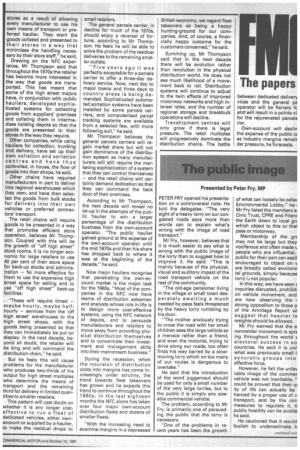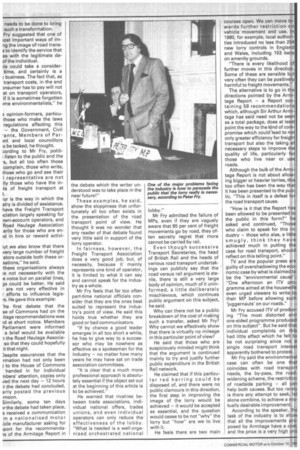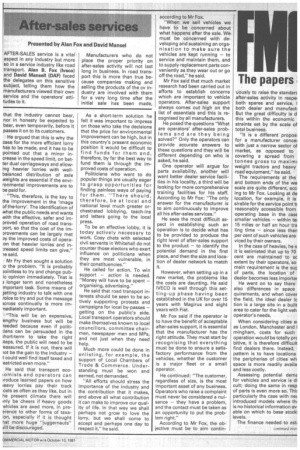Presented by Peter Fry, MP PETER FRY opened his presentation
Page 23

Page 24

Page 25

If you've noticed an error in this article please click here to report it so we can fix it.
on a controversial note. He told the delegates: "The very sight of a heavy lorry on our congested roads says more than words can to explain what's wrong with the image of road transport."
Mr Fry, however, believes that it is much easier to say what is wrong with the public image of the lorry than to suggest how to improve it. He said: "This is mainly because of the physical, visual and auditory impact of the road transport vehicle on the rest of the community.
"The old-age pensioner living in the village or small town desperately awaiting a much needed by-pass feels threatened by the heavy lorry rumbling by his door, "The mother anxiously trying to cross the road with her small children sees the large vehicle as a menace rather than a friend, and even the motorist, trying to drive alone our roads, too often finds his way barred by a slowmoving lorry which on too many of our routes is dangerous to overtake."
He said that the introduction of the word juggernaut should be used for only a small number of the very large lorries, but to the public it is simply any sizeable commercial vehicle.
The problem, according to Mr Fry, is primarily one of persuading the public that the lorry is necessary.
"One of the problems in recent years has been the growth of what can loosely be callec Environmental Lobby," he Mr Fry listed the members al Civic Trust, CPRE and Frienc the Earth down to local grc which object to this or that pass or motorway.
Membership of the grc may not be large but they vociferous and often made u people who are influential. public for their part can easil encouraged to object on v are broadly called environn tel grounds, simply because lorry iJ not popular.
In this way, we have seen r inquiries disrupted, prohibiti on vehicle movement, and are now observing the r strong opposition to those p of the Armitage Report wl suggest that heavier lo weights should be allowed.
Mr Fry warned that the e ronmental movement is sprE ing throughout the world v electoral success in so countries. He said it is tin!, what was previously small i, syncratic groups into effective force.
However, he felt the unfav rable image of the commer vehicle was not inevitable. " could be proved that their qi ity of life can actually be hanced by a proper use of n transport, and by the con measures to regulate it, tl public hostility can be avoide he said.
He cautioned that it would foolish to underestimate h needs to be done to bring such a transformation.
Fry suggested that one of lost important ways of imng the image of road transs to identify the service that es with the legitimate deof the individual.
is could take a considertime, and certainly is a ( business. The fact that, as transport costs, in the end )nsumer has to pay will not st on transport operators, if it is sometimes forgotten In-le environmentalists," he
) opinion-formers, particuthose who make the laws regulations affecting this — the Government, Civil 'ants, Members of Parent and local councillors o be tacked, he thought.
cording to Mr Fry, politi; listen to the public and the Sr but all too often those complain, those who write, those who go and see their I representative are not Ily those who have the inIs of freight transport at t.
or is the way in which the stry is divided of assistance. have the Freight Transport 'dation largely speaking for )wn-account operators, and Road Haulage Association arily for those who are en;c1 in hire or reward activi
;ut we also know that there very large number of freight .ators outside both these orsations," he said.
these organisations always ce not necessarily with the e voice but on parallel lines, gs could be better. He said
are not very effective in
efforts to influence legisr-s. He gave this example:
he first debate that the se of Commons had on the itage recommendations was )id at short notice. Members Parliament were informed a brief would be available 1 the Road Haulage Associaso that they could hopefully it that night.
)espite assurances that the rmation had not only been
t to the House of Commons handed in for individual -nbers' attention, copies only ved the next day — 12 hours
r the debate had concluded, arly posted the previous moon.
Similarly, some ten days ethe debate had taken place,
s received a communication m a nationalised motor icle manufacturer asking for port for the recommendais of the Armitage Report in the debate which the writer understood was to take place in the near future!"
These examples, he said, show the sloppiness that unfortunately all too often exists in the presentation of the road transport point of view. He thought it was no wonder that any reader of that debate found very little said in support of the lorry operator.
In fairness, however, the Freight Transport Association does a very good job, but, of necessity, because it mainly represents one kind of operator, it is limited to what it can say and cannot speak for the industry as a whole.
Mr Fry feels that far too often part-time national officials consider that they are the ones best suited to represent the industry's point of view. He said this holds true whether they are good or bad communicators.
"If by chance a good leader emerges in all too short a while, he has to give way to a successor who may be nowhere as effective as a spokesman for the industry — no matter how many years he may have sat on trade association committees.
"It is clear that a much more professional approach is absolutely essential if the object set out at the beginning of this article is to be achieved."
He warned that rivalries between trade associations, individual national offers, trades unions, and even individual operators can only reduce the effectiveness of the lobby. "What is needed is a well-organised orchestrated national lobby."
Mr Fry admitted the failure of MPs, even if they are vaguely aware that 85 per cent of freight movements go by road, they often secretly regret that more cannot be carried by rail.
Even though successive Transport Secretaries, the head of British Rail and the heads of various road transport undertakings can publicly say that the ' road versus rail argument is sterile, there is still a very large body of opinion, much of it uninformed, a little deliberately mischievous, which continues public argument on this subject, he said.
Why can there not be a public breakdown of the cost of making such a transfer, asked Mr Fry? Why cannot we effectively show that there is virtually no mileage in this particular point of view?
He said that those who are suspiciously minded might think that the argument is continued mainly to try and justify further public expenditure in the British Rail network.
He claimed that if this particular red herring could be disposed of, and there were no public clamours in this direction, the first step in improving the image of the lorry would be achieved — it would be accepted as essential, and the question would cease to be not "why" the lorry but "how" are we to live with it.
He feels there are two main courses open. We can move towards further restriction on vehicle movement and use. In 1980, for example, local authorities introduced no less than 254 new lorry controls in England and Wales, including 153 bans on amenity grounds.
"There is every likelihood of further moves in this direction. Some of these are sensible but very often they can be positively harmful to freight movements."
The alternative is to go in the directions pointed by the Armitage Report — a Report containing 58 recommendations which, although Sir Arthur Armitage has said need not be seen as a total package, does at least point the way to the kind of compromise which could lead to not only greater efficiency for freight transport but also the taking of necessary steps to improve the quality of life, particularly for those who live near or use roads.
Although the bulk of the Armitage Report is not about allowing bigger or heavier lorries, this too often has been the way that it has been presented to the public. "This in itself is a defeat for the road transport cause.
"How is it that the Report has been allowed to be presented to the public in this form?" he asked and continued, "Those who claim to speak for this industry — those who alas, a little smugly, think they have achieved much in putting the case for road transport, should reflect on this telling point."
TV and the popular press are guilty of overshadowing the economic case by what is claimed to be the "environmental cause". "One afternoon an ITV programme aimed at the housewife even urged viewers to write to their MP before allowing such 'juggernauts' on our roads."
Mr Fry accused ITV of producing "The most distorted and one-sided programme produced on this subject". But he said that individual complaints on this had little effect which he felt to be not surprising since not a single road transport interest apparently bothered to protest.
Mr Fry said the environmental case can often be one that coincides with road transport needs, the by-pass, the roadwidening scheme, the restriction of roadside parking — all can help both causes. But too rarely is there any attempt to seek, let alone combine, to achieve a mutually desirable improvement.
According to the speaker, the task of the industry is to show that all the improvements proposed by Armitage have a cost, and the price is a very high one that the industry cannot bear, nor in honesty be expected to bear, even temporarily, before it passes it on to its customers.
He argued that this is why the case for the more efficient lorry has to be made, and it has to be pointed out that a minor increase in the speed limit, on better dual carriageways and allowing heavier lorries with wellbalanced distribution of axle weights are essential if the environmental improvements are to he paid for.
"This, therefore, is the key to the improvement in the 'image of the-lorry'. The identification of what the public needs and wants with the effective, safer and improved operation of road transport, so that the cost of the imProvements can be largely met py the improved costs of opera:on that heavier lorries and inxeased speed limits can give," le said.
Mr Fry then sought a solution
the problem. "It is probably )ointless to try and change pubic opinion immediately. That is 3 longer term and nonetheless mportant task. Some means of jetting industry to talk with one mice to try and put the message )cross continually is more im-nediately important.
"This will be an expensive, engthy business but will be leeded because even if politi;ians can be persuaded in the ;hort-term to take the right ;tees, the public will need to be .eassured. If it is not, there will lot be the gain to the industry — t could well find itself taxed and estricted even more."
He said that transport ecoiomists and operators can iroduce learned papers on how ieavy lorries pay their track osts as often as they like, but in he present climate there will inly be cheers if -heavy goods :ehicles are axed more, in prearence to other forms of taxaion, especially if it is thought hat more huge "juggernauts" ilI be discouraged.
As a short-term solution he felt it was important to impress on those who take the decisions that the price for environmental improvement can be high, but in this country's present economic position it would be difficult to find funds for them and, therefore, by far the best way to fund them is through the improved costs of operation.
Politicians who want to do popular things are usually eager to grasp opportunities for finding painless ways of paying for them, "There should, therefore, be at local and national level much greater orchestrated lobbying, teach-ins and letters going to the local press.
To be an effective lobby, it is today actively necessary to work. Cosy chats with selected civil servants in Whitehall do not counter those electors who exert influence on politicians when they are most vulnerable, in their constituencies."
He called for action. To win support — action is needed. "Money will have to be spent — organising, advertising."
He said that road transport interests should be seen to be actively supporting protests and campaigns for local by-passes — getting on the public's side. Local transport operators should make themselves known to local councillors, committee chairmen, newspaper men and MPs, and not just when they need help.
Much more could be done in enlisting, for example, the support of Local Chambers of Trade & Commerce. Understanding must be won and earned, not demanded.
"All efforts should stress the importance of the industry and the contribution that it makes, and above all what contribution it can make to improve our quality of life. In that way we shall perhaps not grow to love the lorry, but we shall come to accept and perhaps one day to respect it," he said.
























































